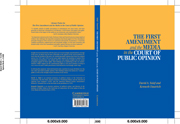Book contents
- Frontmatter
- Contents
- List of Tables and Figures
- Preface and Acknowledgments
- 1 Freedom of the Press and the Power of Public Opinion
- 2 Surveying the Public on Press Freedoms
- 3 What Americans Know About the Freedom of the Press
- 4 Public Support for the Freedom of the Press
- 5 Support for Press Freedoms Across Media: Comparing Print, Electronic, and the “New Media”
- 6 Support for Press Freedoms within a Medium: Elite, Mainstream, and Tabloid News Sources
- 7 Public Opinion, the First Amendment, and the Challenges of the Twenty-First Century
- Appendix: Annotated Questionnaires
- References
- Index
3 - What Americans Know About the Freedom of the Press
Published online by Cambridge University Press: 05 June 2012
- Frontmatter
- Contents
- List of Tables and Figures
- Preface and Acknowledgments
- 1 Freedom of the Press and the Power of Public Opinion
- 2 Surveying the Public on Press Freedoms
- 3 What Americans Know About the Freedom of the Press
- 4 Public Support for the Freedom of the Press
- 5 Support for Press Freedoms Across Media: Comparing Print, Electronic, and the “New Media”
- 6 Support for Press Freedoms within a Medium: Elite, Mainstream, and Tabloid News Sources
- 7 Public Opinion, the First Amendment, and the Challenges of the Twenty-First Century
- Appendix: Annotated Questionnaires
- References
- Index
Summary
Rights of free expression serve as the cornerstone of liberty in the U.S. political culture. While no such rights were included in the Constitution as it was adopted in 1789, some of the framers argued for the incorporation of free expression rights at the outset, and they successfully secured inclusion of those rights two years later in the First Amendment to the Constitution. Democratic theorists and more casual observers of the American political system agree that free expression rights provide the basis for the free flow of information that the public needs in a free society to make important electoral choices and other decisions (Murphy, 1991). Free expression rights also facilitate a robust debate on policy issues and assist the public and policymakers alike in forming opinions based on a thorough exploration of issues and positions.
As we argued in Chapter 1, the most salient roles the press serves in exercising its freedoms are as (1) watchdog of public officials and institutions, (2) an important channel through which political leaders can reach the public, and, occasionally, (3) an advocate of the public will. Given the importance of these functions, one might anticipate a high level of support for these freedoms (resulting from political socialization) (see Jennings and Niemi, 1983), as well as a high level of awareness and recognition of those rights by citizens. Because the American political culture endorses and encourages free-spirited political debate and participative democracy, one would naturally expect the mass public to express at least some awareness and understanding of these core rights.
- Type
- Chapter
- Information
- Publisher: Cambridge University PressPrint publication year: 2002



